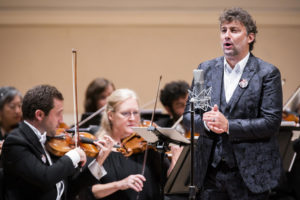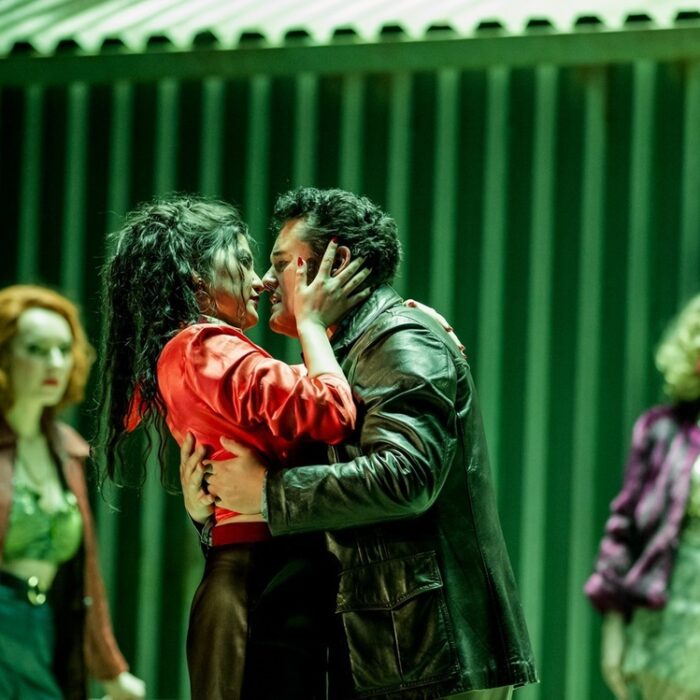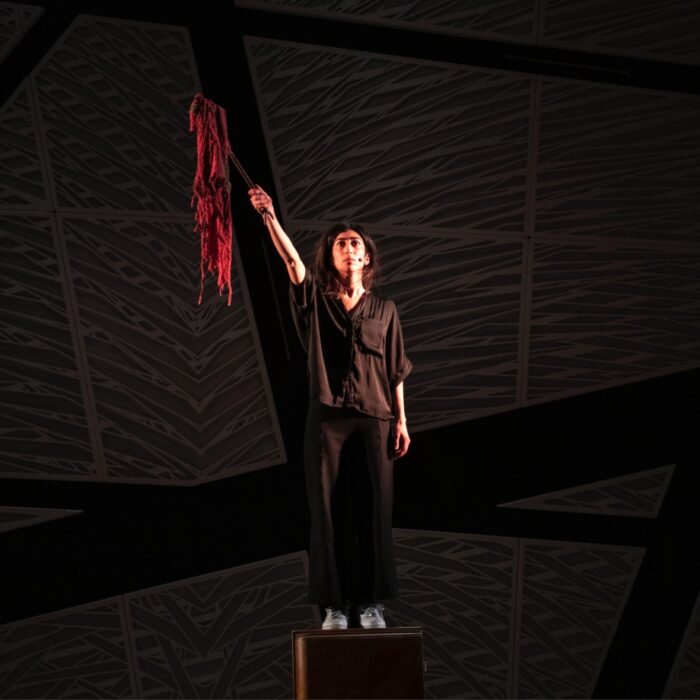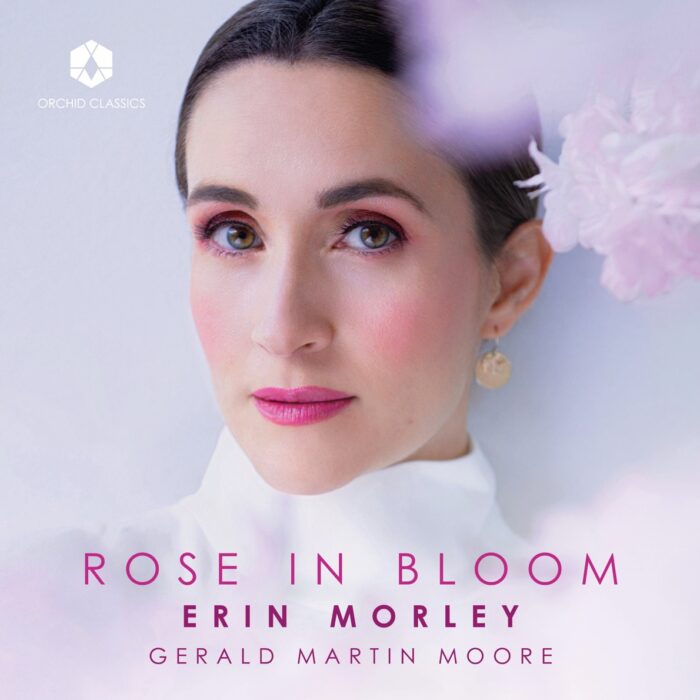
Carnegie Hall 2018-19 Review: Jonas Kaufmann
An Unsatisfying Appetizer Despite Incredible Singing From The Star Tenor
By Francisco SalazarIt was a special evening at Carnegie Hall. It was the return of Jonas Kaufmann to New York, where he is also slated to return to the Metropolitan Opera this season.
So it was fitting the tenor would serve up an appetizer to the New York public in anticipation for his big opera return. The delightful program, which was made up of operetta and Hollywood classic, was just the right fit to give audiences a preview of the tenor’s lush voice.
However, it was ultimately a rather disappointing evening that felt more like the start of a program lacking a middle and an ending.
A Microphone & Bombastic Orchestra Steal Kaufmann’s Thunder
If there was any reason to see this concert it was to see Kaufmann, who has for so long made rare appearances in New York. When he’s onstage, we want him there all the time.
This was far from the case on Oct. 5, 2018 as the tenor was rarely on stage. While Kaufmann performed nine arias and songs, it was the orchestral interludes by the orchestra that dominated the program and which showcased the most musical diversity of the evening. With numerous waltzes, marches, and overtures, and a light atmosphere overall, one felt a desire to see these musical selections come to life at some point with dancers or stage choreography of some kind; that there weren’t any prove one of the most frustrating aspects of the evening. If not for the four encores that the tenor performed at the end, it would have felt like a program by the Orchestra of St. Luke’s featuring Jonas Kaufmann, not vice versa.
And then there was the elephant in the room – the microphone.
When Kaufmann entered the auditorium he explained that the use of the microphone was because some of the pieces were not operatic and that he wanted to bring back audiences to the 1920s how these pieces were performed. Per outside sources, he used this microphone on his European tour and while it was effective for some of the pieces like those of May, Stolz, Spoliansky, and three of his four encores where he wasn’t using his full operatic voice, it took away from Kaufmann’s grandiose voice in the operetta selections and at times it became a huge distraction.
But the biggest issue with the concert was the musical interpretation itself. Jochen Rieder, the German conductor who has accompanied Kaufmann throughout the tour and who recorded the album “You Mean the World to me,” which the concert was based on, had the tendency of depending on the bombastic percussions for a grander effect. While there was incredible rhythmic precision in Walztes from “The Merry Widow” and “Giuditta,” the overture from “Graffin Mariza” and “Das Lands des Lächelns” were filled with bombast that took the brilliant colors away from the music. And Rieder also had a tendency to cover Kaufmann on many occasions, even with the mic.
The result? An incredibly unbalanced evening.
Thank God for Kaufmann Though
But let’s forget the negatives and let’s concentrate on what we all came to see.
Kaufmann, who was returning to the stage of Carnegie Hall for the third time this year, brought his sublime voice to the concert space albeit amplified.
While he started a bit rocky in the aria from “Grafin Mariza” with some noticeably nervous phrasing, he came into his own in “Du bist die Welt fur mich,” his second selection caressing each phrase with gorgeous fil di voce phrasing. At the end of the aria, he began his note with a pianissimo sound crescendoing to a fortissimo, reminding us of the the tenor’s brilliant technical and musical gifts.
In the aria “Gern hab’ich die Frau’n gekust” from “Paganini” and “Ein geht um die Welt” by May, Kaufmann scaled back his tenor voice, showcasing a more Jazzy and suave style. Here he played with the pianissimos in his voice and also interacted more with the mic, which helped to amplify some of the softer hushed sounds that were produced from Kaufmann’s instrument.
To conclude the first half of the program Kaufmann sang “Freunde, das Leben ist lebenswert” from “Giuditta” opening with a heroic tone that boomed into the auditorium. He quickly scaled it down, bringing his lyric phrasing to the fore with a gorgeous piano sound. But towards to the climax of the piece, he reinstated the forte sound, climaxing on a gleaming high note that resonated throughout the auditorium.
The second half was more relaxed with Kaufmann showcasing a charming and charismatic persona. In aria “Hab’ein blaues Himmelbett” from “Frasquita,” Kaufmann swayed alongside the orchestral interludes and sang with a more straighter tone. He sang with polish and relished the text, the aria’s coming to an end with a soft pianissimo line.
The next two pieces, “Im Traum hast du mir alles erlaubt” and “Heute Nacht oder nie,” were also sung without his full tenor voice. Here he sang with a soft piano sound caressing each phrase with beauty and he swayed to the jazzy interludes playing with the microphone.
To conclude the evening Kaufmann sang his signature “Dein ist mein ganzes Herz” from “Das Land des Lächelns.” Here he juxtaposed the tender mezzo piano lines with the powerful forte sound that he produces with such ease. Finally, he brought down the house with a powerful B Flat, eliciting incredible energy from the crowd. It was exactly what the audience was expecting all night and it was a good way to end the program.
He went on to repeat that same aria as one of his four encores but this time in English. As the final encore, it was a surprise to the audience and he gave it the same lush sound, milking some of the phrases and extending some of the longer lines for more effect. As with the first time, he ended with a climatic B Flat.
The other three encores included “Don’t ask me why” which elicited laughter when he sang the phrase “Don’t ask me why I’m laughing” as we as “Irgendwo auf der Welt” and “It Would Be Wonderful Indeed” The three pieces showed Kaufmann more relaxed as he swayed onstage and interacted with the audience in a charming matter.
Overall the evening was filled with exciting singing from Kaufmann but one wished this spectacle would have seen more of the tenor and less of the orchestra.


